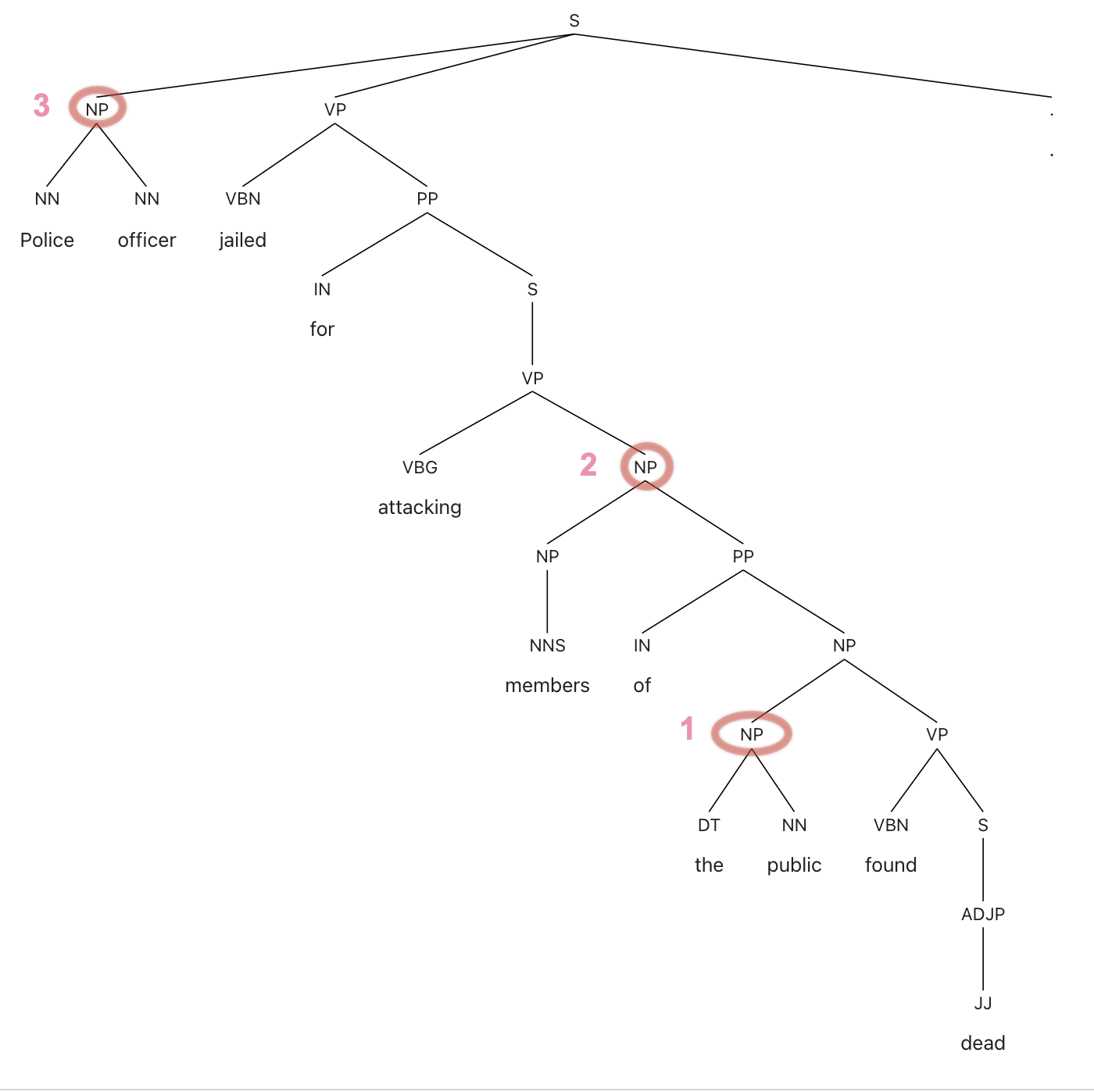"…attacking members of the public found dead"
« previous post | next post »
A striking example of the post-modifier attachment ambiguity: "Police officer jailed for attacking members of the public found dead", The Guardian 12/29/2021.
Bob Ladd, who sent in the link, spent "quite a few hundred milliseconds" puzzling about why the police officer had attacked dead people.
The Berkeley parser gets the attachment even more wrong, construing the headline to refer to "members of [the public found dead]":
I've labelled the three NPs that could be post-modified by "found dead" — and the correct answer would have been #3, the police officer.
The Stanford dependency parser decides on #2 as the modified NP:

And spacy puts the attachment a bit further to the left (though still not in the right place), but still gets the parse wrong, construing "jailed" rather than "found" as the main verb:
Dep tree Token Dep type Lemma POS
──────────────────── ───────── ──────── ─────── ──────────
┌─► Police compound police NOUN
┌─►└── officer nsubj officer NOUN
┌┬┬───────────┴───── jailed ROOT jail VERB
││└─►┌────────────── for prep for ADP
││ └─►┌─────────── attacking pcomp attack VERB
││ └─►┌──────── members dobj member NOUN
││ └─►┌───── of prep of ADP
││ │ ┌─► the det the DET
││ └─►└── public pobj public NOUN
│└──────────────►┌── found advcl find VERB
│ └─► dead oprd dead ADJ
└──────────────────► . punct . PUNCT
The obligatory screenshot:


Lydia W. said,
December 29, 2021 @ 5:42 pm
I have to say that this one didn't really confuse me upon first reading. Perhaps it's because of a tendency to perform a "greedy match", taking as many words as possible to be part of one noun phrase?
Either that, or it's due to the two types of elision here; we can complete the sentence as "(A) police officer (has been) jailed for attacking members of the public (who were) found dead" or "(A) police officer (who was) jailed for attacking members of the public (has been) found dead", and I suspect that the relative clause omission is more common, though this might depend on one's level of exposure to headlinese in particular.
David Marjanović said,
December 29, 2021 @ 5:50 pm
Interestingly, the subtitle shows the headline is shortened too much – he wasn't in jail when he was found dead, he "is believed to have just left prison", so he had been jailed earlier.
Brett said,
December 29, 2021 @ 6:53 pm
@David Marjanović: No, I don't think the headline implies that he was in jail at the present time. Passives with the linking verb omitted are normally expanded in the past tense, giving, "officer who was jailed," in this case; or even the past perfect, giving "officer who had been jailed." Neither expanded phrasing implies that the officer is presently jailed, and the past perfect actually implies that he has since been released from custody. Of course, the passive, "officer who is jailed" certainly could exist on its own, but that's not what this use of "officer jailed" indicates. However, I'm not certain whether that is a purely a matter of pragmatics (meaning whether or not a similar passive could be naturally expanded in the passive in the right context—which a British newspaper headline being, in any case, an almost paradigmatically wrong context).
As whether it would be difficult to interpret the whole hed correctly: I found that, "jailed for attacking members of the public," was such a natural passive adjectival that my parser instantly recognized the "found" that came immediately after as the main verb, attached to the correct subject.
Jerry Packard said,
December 29, 2021 @ 9:06 pm
Way cool.
AntC said,
December 29, 2021 @ 9:11 pm
@Brett No, I don't think the headline implies that he was in jail at the present time.
I do: on reading the headline I inferred he'd been found dead in jail. It seems to happen quite a bit. Nothing clashed with my pragmatics. (And I was already speculating if other 'members of the public' in said jail had taken it upon themselves to avenge for the attacking.)
So it was quite a surprise when @David M pointed out the sub-hed.
I think @Brett's "… are normally …", "… implies … implies …", "… difficult to interpret …", "… such a natural …" are specious arguments.
Bob Ladd said,
December 30, 2021 @ 2:13 am
@Brett: Yes, jailed for attacking members of the public is a perfectly natural constituent, but police officer jailed for X is an equally natural headline, and if you start reading with that in mind, it's a natural assumption that the everything after the for is going to specify what the officer was jailed for. It may be pragmatically relevant that there have been a few high-profile cases of police misconduct in the UK over the last year or so.
Allan from Iowa said,
December 30, 2021 @ 8:23 am
There have been quite a few high-profile cases of police misconduct in the US too, but unfortunately "police officer jailed for X" doesn't happen often enough for that to be a natural headline.
Coby Lubliner said,
December 30, 2021 @ 11:50 am
English (especially American) headline language has its own grammar (no copula, no articles, comma for "and" etc.), so I wouldn't expect any useful results from parsing algorithms meant for the standard .
Alexander Browne said,
December 30, 2021 @ 12:47 pm
Contra David and AntC, I agree with Brett and didn't expect that he died in jail, although had that been the case, it would still work for me. (Native upper midwest US English speaker)
Cervantes said,
January 2, 2022 @ 10:08 am
Headline I just saw today: "Tutu remains interred."
Philip Taylor said,
January 3, 2022 @ 6:15 am
Apropos of Cervantes' last comment, I am 99.9% certain that I heard a South African speak of the late Desmond Tutu as "the Arch" yesterday. Is this abbreviation of "Archbishop" recorded in the literature ?
Alexander Browne said,
January 3, 2022 @ 8:48 am
Philip Taylor: The BBC World Service preceded a clip, of President Ramaphosa if I am remembering correctly, calling him "Arch", by saying something like "as he was known locally".
Neil Strickland said,
January 7, 2022 @ 6:26 pm
I read the headline, then I had to read it again and again. I realize that headlines are supposed to summarize what follows but this headline failed. I would rewrite the headline as "Police officer, jailed for attacking members of the public, found dead." This takes up more space but adding the commas makes it clearer that he was found dead, not the members of the public.